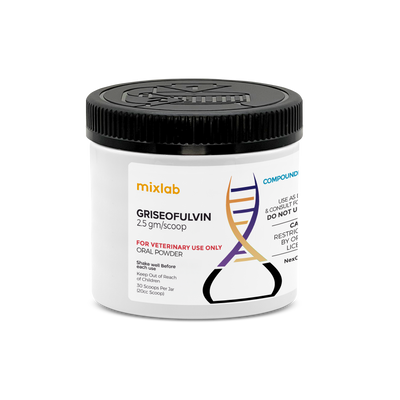
Fenbendazole 1.5 gm/scoop, Oral Powder, 30 Scoops (15cc Scoop)
Login for pricing
- Brand
- Mixlab
- SKU:
- NC-0537
- Product Type:
- Powder
- Size:
- 16oz
- Administration:
- Oral
- Scoops Per Container:
- 30
- Scoop Size:
- 15cc
Parasites and worms are very common in companion animals (including exotic animal species), livestock and working animals. Thus, they are among the most common issues that are routinely addressed in veterinary practices. Worms typically affect breeds and pets that have access to the outdoors, but some species may also harbor worms, encysted worm eggs or worm larvae when they are acquired. Some exotic species (e.g., reptiles, ferrets, birds) may also be more likely to be acquired with worms or worm eggs; appearing healthy upon acquisition, they may later present with the symptoms of a worm infestation.1,2
Worms can cause minor ailments such as stomach upset in minor cases, all the way up to death in extreme cases. Worm infestations are regularly reported in horses, cattle and a wide variety of exotic companion animals. In less-developed nations, parasitic worms infect millions of people and animals, and influence how the immune system responds to diseases like HIV and tuberculosis.1
If an animal is experiencing rapid and random weight loss, diarrhea, anemia, scratching of the perianal area, unexplained vomiting, severe bad breath or severe coughing, then veterinary intervention should be considered, as it is a very real possibility that the animal is experiencing some sort of parasitic infestation.
Fenbendazole’s mechanism of action is believed to involve the disruption of intracellular microtubular transport systems by binding selectively and damaging tubulin, which prevents tubulin polymerization and inhibits microtubule formation. Fenbendazole has activity against adult life cycle stages of susceptible parasites and may have larvicidal and ovicidal activity against certain parasites.5-6
Where to buy Fenbendazole
Fenbendazole is available in the U.S. through veterinary pharmacies and veterinary custom compounding companies.
This product carries numerous potential drug interactions. Please consult your veterinarian prior to beginning any treatment regimen.
FOR RX ONLY: A valid prescription from a licensed veterinarian is required for dispensing this medication.
5Daniels SP, Proudman CJ. Ovicidal efficacy of fenbendazole after treatment of horses naturally infected with cyathostomins. Vet Parasitol. 2016;227:151-156.
6Pittman JS, Myers GH, Stalder KJ, Karriker LA. Effect of fenbendazole on shedding and embryonation of Ascaris suum eggs from naturally infected sows. J Swine Health Production. 2015;23(5):252-263.













